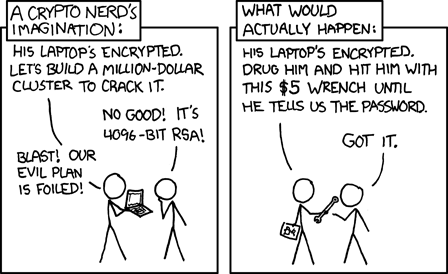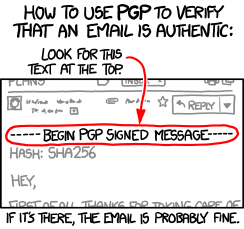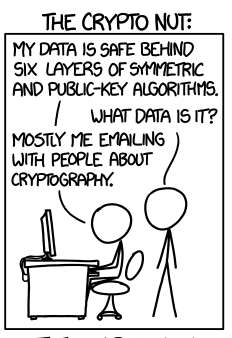Encrypting E-mail with GnuPG, Thunderbird and Enigmail
On Monday, 2 December 2013 I'm giving a presentation at KWLUG on Encrypting E-mail with GnuPG, Thunderbird and Enigmail which will be followed by a Formal Keysigning.
I'm using this page to develop my presentation notes. If you have comments, criticisms, or suggestions please put them on the Talk page.
--Bob.
I've started to convert this page to presentation slides BobJonkman 19:52, 19 November 2013 (UTC)
Contents
Intro to Crypto
Why use Encrypted E-mail?
- Security
- Encrypted mail cannot be read by a Man In The Middle (MITM)
- Authenticity (Integrity)
- Signed mail cannot be modified in transit, accidentally by mis-configured servers, or maliciously by MITM
- Non-repudiability
- Signed mail can only come from the sender
Why NOT use Encrypted E-mail?

- Need the other party to use the same encryption
- Locked-in format
- Lose your secret key, lose your mail
- Need to keep revoked keys to read old mail
- If your key is compromised, all your old mail is compromised (no forward secrecy)
- Non-repudiability
- Politicians? CEOs?
- Rubber Hose Cryptanalysis (or $5 Wrench Cryptanalysis)
- It's hard!
- and looks geeky...
Unencrypted, unsigned message
Date: Mon, 25 Nov 2013 18:27:22 -0500 From: Crypto Guy <cryptoguy@sobac.com> To: Crypto Guy <cryptoguy@sobac.com> Subject: Hello! Hello World!
Unencrypted, signed message
Date: Mon, 25 Nov 2013 18:27:22 -0500 From: Crypto Guy <cryptoguy@sobac.com> To: Crypto Guy <cryptoguy@sobac.com> Subject: Hello! -----BEGIN PGP SIGNED MESSAGE----- Hash: SHA1 Hello World! -----BEGIN PGP SIGNATURE----- Version: GnuPG v1.4.14 (GNU/Linux) Comment: Using GnuPG with Thunderbird - http://www.enigmail.net/ iQEcBAEBAgAGBQJSk9zaAAoJENrSxFs55fZVAAgIAK2BKzV/qUTXCu0gEWJq2U3z mZ6nsfzjs8aXJe8CT/c7kr7HSgSV57kvukIbvcUP5sCGwpIfwK04qA0Af4J9jXp7 Wq1/k0wjA1WzhCWUEEjdBs/05bAbQ78ulTbhFlII2ywLgH6BYxgjceZa9abgF8Di xHkRWEAI6q+scoEhi0rCGlCX3UX/pkiZ1GlaxxxMBu1J5DbFaAJZ1MiPUDOLQN9w 5LzIqi4rKTtnCQo6G3WWRg5HvPMHHmUJoaZfZpnPrszf4ttG0vrFLxJKUqZszDyr V5Lx/IjKAZBwoRRjfpRZILFHWoveaw5MG8487jM76W7LiVTEsX2AFGI3R6uy+KA= =0p58 -----END PGP SIGNATURE-----
Encrypted, signed message
Date: Date: Mon, 25 Nov 2013 18:27:22 -0500 From: Crypto Guy <cryptoguy@sobac.com> To: Crypto Guy <cryptoguy@sobac.com> Subject: Hello! -----BEGIN PGP MESSAGE----- Charset: ISO-8859-1 Version: GnuPG v1.4.14 (GNU/Linux) Comment: Using GnuPG with Thunderbird - http://www.enigmail.net/ hQEMA7bHREkg/1GxAQf/dmPoG27m33QGlUEZ0F9rlndQJFgeAyPBpXVEV2uCgaGw rCzeBOkcE7FMmo2MjiozS64QaynPAGuHYoKwRIYS06Aa3ll2FwFO4O2tGiC1jsGQ EUgjIE8h4iqIG4D5uzsv/iQ14QWJm4vaACxLCEtSaIRYcNB6Kxvy0phydltc3cp1 Ri1OlYPV799yiT7bcdT3ntTew5UF853mUrEIPt3NRfEDrC/m8ScTCT9SD2VRzlfA qMviBt20XgApQscLBOWCAHv+1u2eUQ8AM3OsAZ/K4mw+s/jcWNNqLG9DRrrHJzMK YXiZtLuE02eqpXjxrgfKmUloWAu7p9uQHMRwJjIy89LAugFdmW8HY1eZbpu7kUQU 9PvGydWd0QUPjkG7CXEeh63hmmbJgmJdjqOVjDuXhuHI1xU9+psmLPEszAY1TP9f V4WR7SAIIVtE5r2S3YRwgyXWsPF+VgesBiUtQ7mroSGeVJ6GRR/rn0IdnLabrJsb WXiCAtNajDx/x1QGcxFDIQjNsnqvzraSHwcpX6XelRCIz3jyS3SKDdR0T/x5YkmA mkmXDZlLUntyjbJjZF0LmB96PTAi8JT/OG4QCxTsPMIpkLJZOcQ4SnHsaxfVgLqg gOt5bxT9ybGt17xrw/j/mKpcq9cbyXFVJoRr73OVE8Wg2IYBye4TPu/HfXIGUh70 s4dE1Jc+iqdVLqJ2w3qGo4v8B2pg6bPLde7TT/7NrrvEWg0Zxlr+SFr+60xiyPGu 8eJHtQYSXe4OOc2FZev9mb0M2IIr0zpd7q5MvUqE+4b/VUtmadUFcExuUdaayS0P rgLVNx3285jGXzelaFB2/+Gzx/m7MMXsKMBX7Q== =jfdJ -----END PGP MESSAGE-----
Crypto Theory
Symmetric Key Encryption
- Substitution cipher, Caesar cipher
- Key = -1
- Encrypt: IBM ⇒ -1 = HAL
- Decrypt: Khmtw Trdq Fqnto ⇒ +1 = Linux User Group
- Key = 13 (ROT13)
- Encrypt: Linux User Group ⇒ +13 = Yvahk Hfre Tebhc
- Decrypt: Yvahk Hfre Tebhc ⇒ +13 = Linux User Group
- Key = -1
- Need a secure way to share key
Public/Private Key Encryption
The Math
Based on One-way function: Easy to do, hard to reverse
- 59 x 61 = ????
- 59 x 61 = 3599
- 3551 = ?? x ??
- 3551 = 53 x 67
The Theory
Generate a keypair
- Add name, e-mail and comment (doesn't have to be your real name or e-mail)
- Public Key, Private (Secret) Key
- Anything encrypted by one key is decrypted by the other
- Encrypt: Hello World ⇒ Public Key = |-|3110 '//0|21|)
- Decrypt: |-|3110 '//0|21|) ⇒ Secret Key = Hello World
- Encrypt: Linux Is Cool ⇒ Secret Key = 1!/\/|_|>< !5 (001
- Decrypt: 1!/\/|_|>< !5 (001 ⇒ Public Key = Linux Is Cool
In Practice
- GnuPG/PGP uses a symmetric key, not Public/Secret keys to encrypt a message
- Symmetric Key generated by Pseudo Random Number Generator (PRNG)
- Symmetric Key is encrypted with recipient's Public Key
- Bob encrypts a message to Alice
- GnuPG/PGP generates a random Symmetric Key
- Message ⇒ Symmetric Key = |\/|355463
- Symmetric Key ⇒ Alice's Public Key = 5`/|\/||\/|37|2!( |<3`/
- Bob sends |\/|355463 5`/|\/||\/|37|2!( |<3`/ to Alice
- Alice decrypts a message from Bob
- Alice receives |\/|355463 5`/|\/||\/|37|2!( |<3`/ from Bob
- 5`/|\/||\/|37|2!( |<3`/ ⇒ Alice's Secret Key = Symmetric Key
- |\/|355463 ⇒ Symmetric Key = Message
- Bob signs a message
- Message ⇒ Hash = ABC
- ABC ⇒ Bob's Secret Key = 4|>(
- Alice checks Bob's signature
- 4|>( ⇒ Bob's Public Key = ABC
- Message ⇒ Hash = ABC
- Same result? Message is untampered!
Practical GnuPG/PGP
- Keep your Secret Key secret!
- But you can distribute your Public Key widely
- Upload your Public Key to keyservers
- Send your Public Key by e-mail
- Use a Public Key to encrypt a message
- Only that person's Secret Key can decrypt it
- You can only encrypt a message to someone whose Public Key you have
- Use your Secret Key to sign a message
- Anyone can use your Public Key to verify the signature
- You can sign messages for everyone!
- But only people who have your Public Key can verify the signature
- Shows others that encryption is not such a weird thing
- If I download your Public Key, how do I know it's really yours?
Keysigning!
- You tell me what your Key Fingerprint is.
- I verify that's the same Key Fingerprint on your Public Key I download
- If I believe that's your Public Key, I sign it.
- Alice's Public Key ⇒ Bob's Secret Key = 5!6|>0|>
- Alice's Public Key + 5!6|>0|> = Alice's Public Key5!6|>0|>
- Alice is popular: Alice's Public Key5!6|>0|>5!6(4|2015!6|\/|41(01|\/|
- Alice's Public Key is signed by Bob, Carol and Malcolm
Web of Trust
- Carol's Public Key has been signed by others
- Carol's Public Key5!641!(35!6|\/|41(01|\/|
- Carol's Public Key is signed by Alice and Malcolm
- 5!641!(3 ⇒ Alice's Public Key = Carol's Public Key
- Alice signed Carol's Public Key, ∴ Alice trusts Carol
- Bob signed Alice's Public Key, ∴ Bob trusts Alice
- By association, Bob trusts Carol (a little)
- Bob also signed Malcolm's Public Key, ∴ Bob trusts Malcolm
- Both Alice and Malcolm signed Carol's Public Key, so Bob trusts Carol (more than a little)
- Alice and Malcolm are Trusted Introducers for Carol
Demonstration
Install Enigmail
Use Wizard
Generate keypair
If your Key Fingerprint is 04F7 742B 8F54 C40A E115 26C2 B912 89B0 D2CC E5EA
- Then your Long KeyID is 0xB91289B0D2CCE5EA
- And your Short KeyID is 0xD2CCE5EA
- Short KeyID is unique to about 1 in 10 billion (2^32)
- Long KeyID is unique to about in 10^20 (2^64)
- Key Fingerprint is unique to about 10^48 (2^160)
- Number of atoms in the universe is about 10^80
Configure Enigmail
Generally, use the defaults.
- I chose DSA for my key because of patent restrictions in 1999
- Use PGP/MIME to hide signature blocks
- But displaying signature blocks may encourage others to use encryption
- Some mailing lists may remove PGP/MIME signature attachments
Retrieve a Public Key
- E-mail address is convenient, but may return multiple keys
- KeyID search will return one key. Prefix KeyIDs with "0x"
Sending a Message
- OpenPGP → Default Composition Options → Signing/Encryption Options
- OpenPGP → Per-Recipient Options
Receiving a Message
How to use PGP to verify an e-mail is authentic

from http://xkcd.com/1181
Fortunately, Enigmail checks a little more thoroughly!
Keysigning with Enigmail
- OpenPGP → Key Management → Edit → Sign Key
Resources

Other tools
- Evolution — Built-in support for GnuPG
- Claws — Plugins PGP/Core, PGP/Inline, PGP/MIME
- KMail — use gnupg2 package
- Mutt — Built-in support
- GMail — Use Chromium and plugin cr-gpg
- Other Webmail (Yahoo!, Hotmail, &c.) — Cut'n'paste with Firefox plugin WebPG (doesn't work for me)
Support
- KWCrypto Interest Group: http://sobac.com/kwcrypto
- PGP-Basics mailing list: http://groups.yahoo.com/neo/groups/PGP-Basics/info
- KWLUG: http://kwlug.org
This presentation is online at http://sobac.com/KWCrypto/kwlug-2013-12-02/
Bob Jonkman
- E-mail: mailto:bjonkman@sobac.com
- Microblog: @bobjonkman@sn.jonkman.ca or http://sn.jonkman.ca/bobjonkman
- XMPP: xmpp:bjonkman@sobac.com
Thanx to Randall Monroe for releasing XCKD comics under a CC-BY-NC 2.5 license!
The Cryptoparty keypair logo from the Cryptoparty Artwork repository on GitHub is available in the Public Domain.
The Players by Melissa Beth Elliott (@0xABad1dea on Twitter) is used with permission.
This rest of this presentation is © 2013 by Bob Jonkman and released under a CC-BY 4.0 license.

